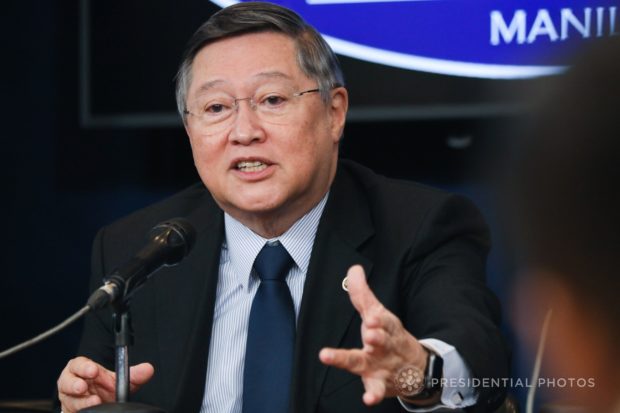
Finance Secretary Carlos Dominguez III. (File Photo by TOTO LOZANO / Presidential Photographers Division)
MANILA, Philippines–The government has committed to accelerate spending on infrastructure and other big-ticket projects to reverse slow growth at the start of the year, the head of the Duterte administration’s economic team said Friday.
The “carefully crafted and bold expenditure catch-up plan” formulated by the interagency Economic Development Council (EDC) during its meeting Friday will allow the economy to grow by over 6 percent, Finance Secretary Carlos G. Dominguez III told a press conference.
To recall, gross domestic product (GDP) growth fell to a four-year low of 5.6 percent in the first quarter, below the government’s downgraded 6-7 percent full-year target range, as the government underspent about P1 billion a day on public goods and services due to the delayed approval of the P3.7-trillion 2019 national budget.
Dominguez said that during their EDC meeting, “key infrastructure agencies presented their updated spending plans for this year,” which would ”substantially offset the lower spending in the first quarter resulting from both the budget delay and the election ban on public works.”
For 2019, the government had programmed to spend a total of P3.774 trillion, equivalent to 19.6 percent of GDP and a tenth more than last year’s actual expenditures.
For infrastructure alone, the government will disburse P1 trillion this year or 5.2 percent of GDP, of which the bulk or P808.7 billion will be for public projects.
Since the government already spent P778 billion during the first quarter, it must spend P2.996 trillion starting the second quarter, Dominguez noted.
In the case of infrastructure, the catch-up plan would allow implementing agencies to disburse P792.9 billion between April and December as the first-quarter expenditures were only P207.2 billion, he added.
“The spending commitment of our two main infrastructure agencies—the Department of Public Works and Highways (DPWH) and the Department of Transportation (DOTr)—with an estimated combined amount of P803.1 billion, is enough to cover the national government’s infrastructure target,” Dominguez said.
“Infrastructure disbursements from other agencies such as the Department of National Defense (DND), the Department of Education (DepEd), and the Department of Health (DOH) can further drive spending growth if they are able to accelerate implementation of their capital outlay programs and projects. Said programs include the Armed Forces of the Philippines (AFP) Modernization Program of the DND, the school building program of the DepEd, and the health facilities enhancement program of the DOH,” according to Dominguez.
Last week, Dominguez said he “wasn’t satisfied” during that week’s EDC meeting as implementing agencies such as the DPWH and the DOTr claimed they can push through with projects but were unable to detail how.
But during Friday’s meeting, Dominguez said “the DPWH and the DOTr remain optimistic that they can deliver on their respective commitments by accelerating infrastructure disbursements and implementation of projects.”
“To enable them to attain their targets, it would require close cooperation and support of other government agencies by expediting the approval of permits and other requirements. Hopefully, no major weather disturbance will disrupt the implementation of the projects,” he said.
“It was also agreed that the government will fast track the implementation of its priority socioeconomic programs, such as the national ID system, 4Ps [Pantawid Pamilyang Pilipino Program], social pension, unconditional cash transfers, and fuel marking program. But aside from the infrastructure and social protection programs, the government also has to double its efforts in the agriculture sector, which should expand by at least 2 percent per year,” according to Dominguez.
The Finance chief was optimistic that economic growth would “expand at a higher clip” starting the second quarter amid easing inflation and faster implementation of the Duterte administration’s ambitious “Build, Build, Build” infrastructure program. (Editor: Jonathan P. Vicente)

